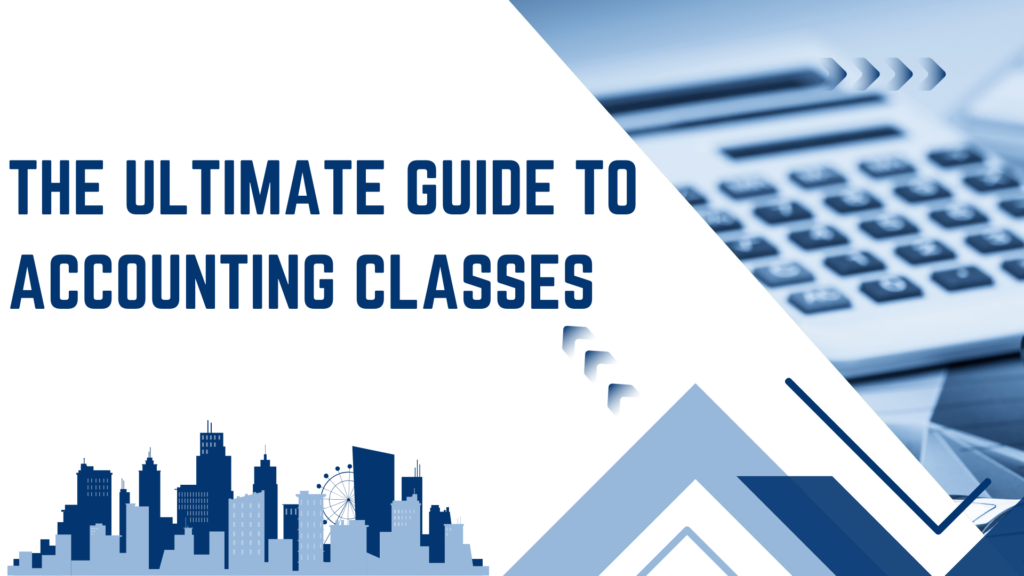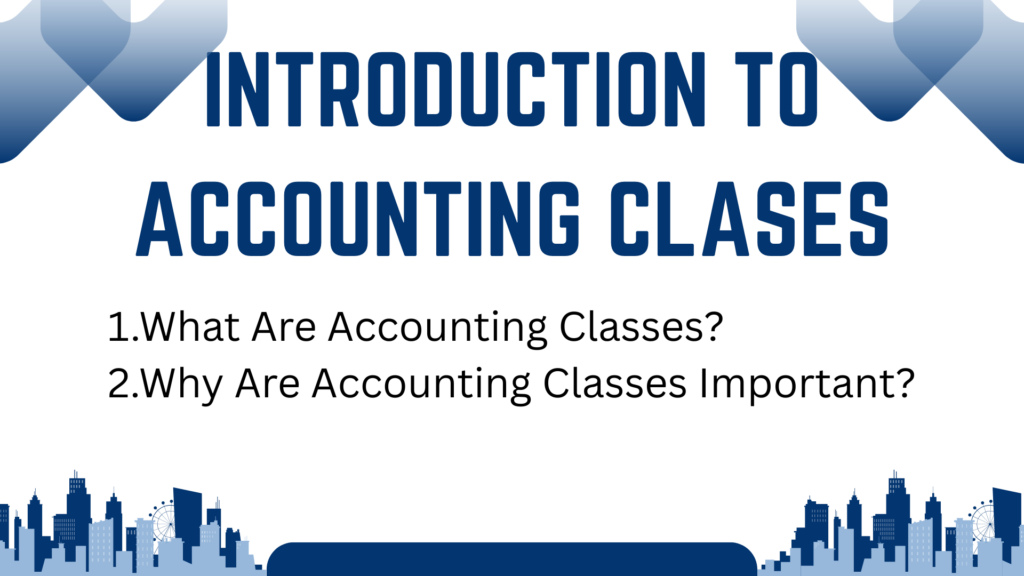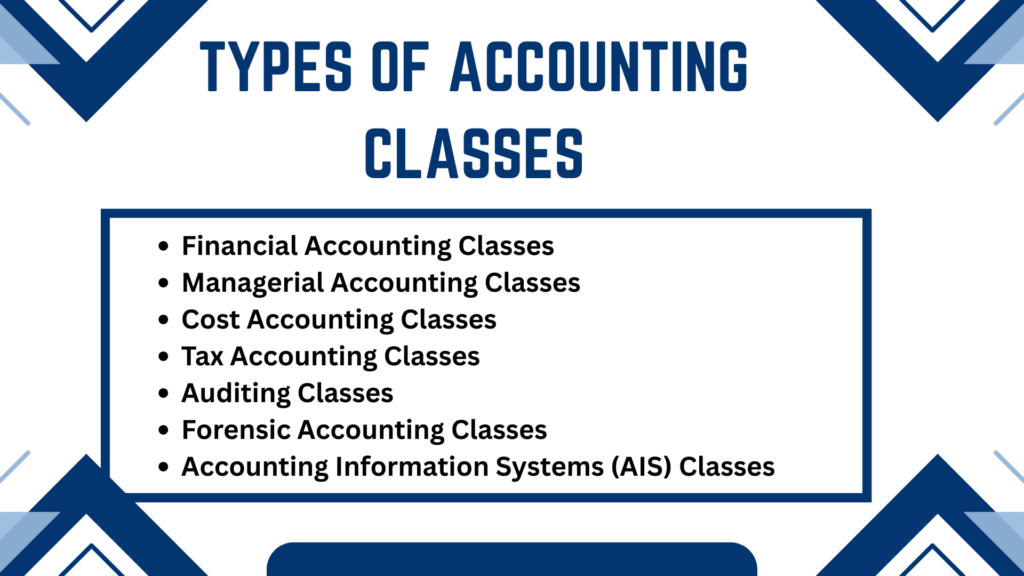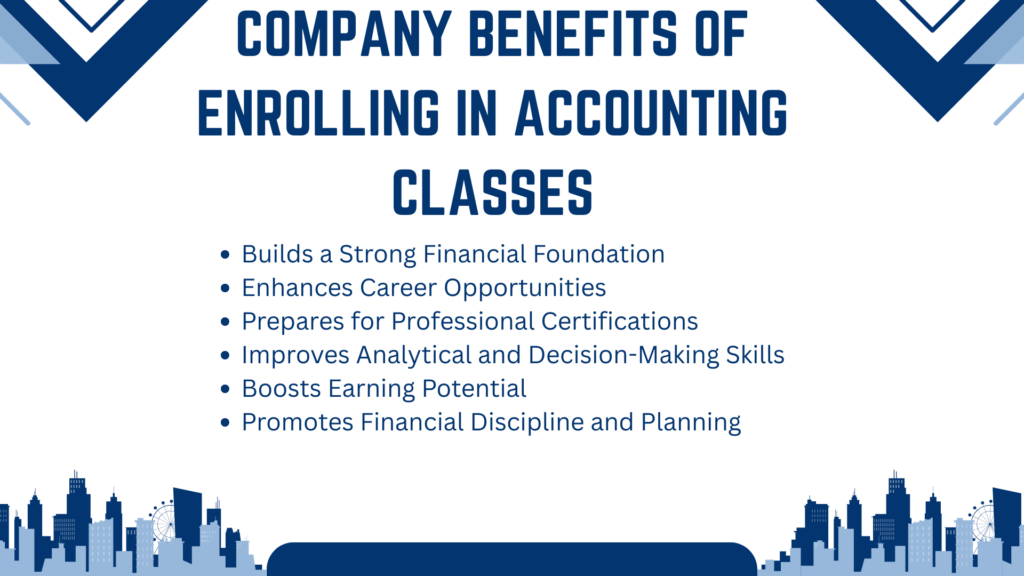The Ultimate Guide to Accounting Classes

Table of Contents
Image of post regarding course
Introduction TO ACCOUNTING CLASES

Thinking about joining accounting classes but not sure where to begin? Whether you’re a student, a job-seeker, or a business owner looking to manage your own finances, can be your golden ticket to mastering the money game. This comprehensive guide breaks everything down for you—step by step, topic by topic.
1.What Are Accounting Classes?
structured courses designed to teach the fundamentals and complexities of accounting. From understanding financial statements to mastering tax laws and budgeting, these classes prepare you to manage money accurately and efficiently.
2.Why Are Accounting Classes Important?
Financial Literacy: Understand how money flows.
Career Advancement: Open doors to high-paying jobs.
Business Growth: Helps entrepreneurs manage and grow.
Tax Management: Avoid penalties by knowing the laws.
Personal Finance: Make informed financial decisions.
3.Who Should Take Accounting Classes?
High school and college students
Entrepreneurs and small business owners
Professionals switching careers
Finance and management students
Freelancers and self-employed workers
Types of Accounting Classes

- Financial Accounting Classes
These accounting classes focus on recording, summarizing, and reporting financial transactions.
Suitable for students who want to understand balance sheets, income statements, and cash flow.
Managerial Accounting Classes
These accounting teach how to analyze and interpret financial data for internal decision-making.
Topics include budgeting, forecasting, and performance evaluation.
Cost Accounting Classes
These classes deal with calculating the cost of production or services.
Ideal for careers in manufacturing or cost control.
Tax Accounting Classes
These classes focus on tax laws, regulations, and tax return preparation.
Useful for students aiming to become tax consultants or IRS agents.
Auditing Classes
teach methods of examining financial records for accuracy and compliance.
Prepares students for roles as internal or external auditors.
Forensic Accounting Classes
deal with investigating financial fraud and litigation support.
Combines accounting, auditing, and investigative skills.
Accounting Information Systems (AIS) Classes
explore the use of information technology in accounting processes.
Topics include databases, software, and cyber security.
olffer image
Top Accounting Certifications
- Certified Public Accountant (CPA)
One of the most prestigious accounting certifications globally.
Recognized for expertise in auditing, tax, and financial reporting.
Required for many senior accounting roles, especially in the U.S.
Chartered Accountant (CA)
Popular in countries like India, UK, Canada, and Australia.
Covers accounting, taxation, auditing, and business laws.
Offered by ICAI (India), ICAEW (UK), and other national bodies.
Certified Management Accountant (CMA)
Focuses on financial planning, analysis, control, and decision support.
Ideal for accounting professionals in corporate finance and management.
Offered by the Institute of Management Accountants (IMA).
Certified Internal Auditor (CIA)
Specializes in internal auditing and risk management.
Globally recognized and offered by the Institute of Internal Auditors (IIA).
Suitable for those interested in audit and compliance careers
Key Subjects Covered in Accounting Classe
olffer image
Financial Accounting
Core subject in most accounting classe.
Covers preparation and analysis of financial statements like balance sheets, income statements, and cash flow statements.
Focuses on GAAP (Generally Accepted Accounting Principles) and IFRS.
Managerial Accounting
Teaches how to use accounting information for internal decision-making.
Topics include budgeting, cost analysis, and performance metrics.
Helps managers plan and control business operations.
Cost Accounting
A common topic in advanced accounting classes.
Focuses on identifying, measuring, and analyzing production and operational costs.
Includes techniques like standard costing, marginal costing, and variance analysis.
Taxation
Accounting include domestic and international tax systems.
Teaches how to prepare individual and corporate tax returns.
Covers tax planning and compliance with laws.
Auditing
Explains the process of examining financial records for accuracy and legality.
Covers internal and external audits, risk assessment, and audit reports.
Prepares students for auditing certifications like CIA and CPA.
Accounting Information Systems (AIS)
Merges IT and accounting in one subject area.
Teaches students to use accounting software, databases, and ERP systems.
Essential for managing digital financial records.
Corporate Accounting
Focuses on accounting practices in large organizations.
Includes topics like share capital, debentures, dividends, and financial restructuring.
Top Skills You’ll Learn in Accounting Classes
Financial Reporting Skills
classes teach how to prepare, analyze, and interpret financial statements.
Includes balance sheets, income statements, and cash flow statements.
Analytical and Critical Thinking
You’ll develop the ability to assess financial data and identify trends, patterns, and inconsistencies.
Crucial for auditing, budgeting, and financial decision-making.
Budgeting and Forecasting Skills
Learn how to create detailed budgets and predict future financial performance.
Helps in strategic planning and resource management.
Tax Preparation and Planning
cover personal and business tax laws.
You’ll gain skills in preparing tax returns and minimizing tax liabilities legally.
Auditing and Internal Controls
Understand how to evaluate internal controls and perform audits.
Learn how to ensure compliance with laws and prevent fraud.
Use of Accounting Software
Gain hands-on experience with tools like Tally, QuickBooks, SAP, or Excel.
s train you to manage digital financial records efficiently.
Cost Management Skills
Learn how to control and reduce business costs using cost accounting techniques.
Important for pricing strategies and profitability analysis.
Duration and Cost of Accounting Classes
Short-Term Accounting Classes (1–6 Months)
Duration: Typically 1 to 6 months.
Cost: ₹5,000 to ₹25,000 in India; $100 to $500 internationally.
Ideal for beginners or those seeking quick skill upgrades like Tally, GST, or basic bookkeeping.
Diploma Accounting Classes (6 Months – 1 Year)
Duration: 6 months to 1 year.
Cost: ₹20,000 to ₹60,000 in India; $500 to $2,000 globally.
Covers subjects like financial accounting, cost accounting, and payroll management.
Undergraduate Degree Programs (B.Com, BBA in Accounting)
Duration: 3 years full-time.
Cost: ₹30,000 to ₹2,00,000 per year in India; $5,000 to $25,000 per year abroad.
In-depth accounting classes that prepare students for corporate and public sector careers.
Postgraduate Programs (M.Com, MBA in Accounting or Finance)
Duration: 2 years.
Cost: ₹50,000 to ₹5,00,000 in India; $10,000 to $50,000 abroad.
Advanced accounting classes focused on financial strategy, analytics, and leadership.
Professional Accounting Certifications (CPA, CMA, ACCA, CA)
Duration: 6 months to 3 years (varies by program).
Cost: ₹1,00,000 to ₹3,00,000+ in India; $1,000 to $5,000 internationally.
Intensive accounting classes with global recognition and high career value.
Online Accounting Classes (Self-paced or Instructor-led)
Duration: Few weeks to several months depending on the course.
Cost: Free to ₹50,000+ / $0 to $1,000+.
Offered by platforms like Coursera, Udemy, edX, and university e-learning portal
Online vs Offline Accounting Classes
| Feature | Online Classes | Offline Classes |
|---|---|---|
| Flexibility | High | Low |
| Cost | Affordable | Usually expensive |
| Interaction | Virtual (Forums, Chats, Zoom) | Face-to-face |
| Pace | Self-paced or scheduled | Fixed schedule |
| Best For | Working professionals, remote areas | Traditional learners |
Benefits of Enrolling in Accounting Classes

Builds a Strong Financial Foundation
balance sheets, income statements, and cash flow.
Helps you understand the financial health of any business.
Enhances Career Opportunities
Completing open doors to roles like accountant, auditor, financial analyst, and tax consultant.
Makes your resume more competitive in the job market.
Prepares for Professional Certifications
Acts as a stepping stone toward prestigious certifications like CPA, CMA, ACCA, and CA.
Gives you the academic grounding required for exam success.
Improves Analytical and Decision-Making Skills
develop your ability to analyze data, control costs, and support business decisions.
Useful for managerial and strategic roles.
Boosts Earning Potential
Professionals with accounting skills and certifications often command higher salaries.
In-demand across industries like banking, corporate finance, and consulting.
Promotes Financial Discipline and Planning
Learn to manage budgets, savings, and investments personally and professionally.
Helps in personal finance management as well.
Career Opportunities After Taking Accounting Classes
Accountant
Prepares and examines financial records.
Ensures accuracy and compliance with laws and regulations.
Auitor
Evaluates financial statements and internal controls.
Can work as an internal, external, or government auditor.
Tax Consultant
Provides tax planning, filing, and advisory services to individuals or businesses.
Stays updated with the latest tax laws and regulations.
Financial Analyst
Analyzes financial data to support investment and business decisions.
Works with budgeting, forecasting, and financial modeling.
Cost Accountant
Focuses on tracking, analyzing, and managing production or service costs.
Helps organizations optimize their cost structures.
Payroll Specialist
Manages employee salaries, tax deductions, and benefits.
Ensures timely and accurate payroll processing.
Budget Analyst
Develops and monitors budgets for organizations.
Ensures efficient allocation of resources.
Accounting Manager
Oversees the accounting department and ensures timely financial reporting.
Supervises staff and handles audits, budgeting, and compliance.
Forensic Accountant
Investigates financial discrepancies and fraud.
Works with law enforcement or in legal cases.
Accounts Payable/Receivable Clerk
Manages incoming and outgoing payments.
Ensures vendors and clients are paid or billed correctly.

![Cash Sales: Master Cash Sales in Tally Easily [2025 Guide]](https://earnready.com/wp-content/uploads/2025/04/ChatGPT-Image-Apr-28-2025-03_22_39-PM.webp)